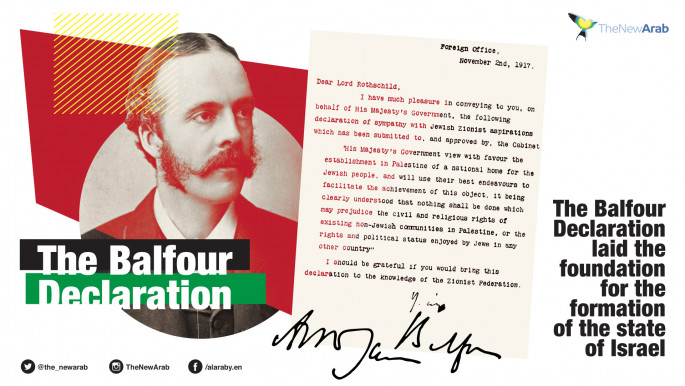
Balfour Apology Campaign: An impossible goal?
The Balfour Apology Campaign, launched by the Palestinian Return Centre (PRC) risks failing to have an impact on the UK government. The campaign represents the demand that Britain apologise for its role in the creation of Israel.
November 2017 will mark the centenary of then Foreign Secretary Arthur Balfour's announcement of British support for the Zionist project in mandate Palestine. But acknowledgment of the perfidious nature of Britain's role seems as distant as ever.
No apology
In 1917 Balfour promised that the colonial power, Britain, would "view with favour the establishment in Palestine of a National Home for the Jewish people". In 2016, the Foreign Office stated that "The Balfour Declaration was a historic statement and one that the UK Government will not be apologising for".
The Apology Campaign, which was launched by the PRC in 2013, states that "We believe that the British government's recognition of its destructive colonial past is a necessary step towards achieving peace, justice and reconciliation. We know that a majority of the British people supports us in this mission, as they have demonstrated in the last few years."
The Balfour Apology Campaign is correct to identify growing popular support for Palestinians as an area of strength, with polls showing comparatively meagre support for Israel in the UK.
Democratic deficit
But, the campaigners' goal "to impact all sections of society through working with politicians, MPs, media, NGOs, charities, students and members of the public to raise the profile of the campaign" looks unattainable.
There is a significant democratic deficit in British foreign policy; low popular support for Israel has little bearing on government policy, which remains four square behind the occupying power.
 |
There is a significant democratic deficit in British foreign policy |  |
Under the Conservatives, the UK appears more staunchly pro-Israel than ever. Shaping the views of powerful politicians and the mainstream media narrative is a major stumbling block for the Palestinian solidarity movement.
The truth of the Balfour Declaration is inconvenient and the UK political establishment continues to try to bury it. In his 2014 book, The Churchill Factor, Foreign Secretary Boris Johnson described the Balfour Declaration as "bizarre", a "tragicomically incoherent" document, and "an exquisite piece of Foreign Office fudgerama".
He has since performed a volte-face, calling the Declaration "a great thing" that "reflected a great tide of history".
Meanwhile, Prime Minister Theresa May intends to celebrate the Balfour centenary with "pride".
Deep commitment
As in 1917, the UK political establishment sees more profit in supporting the Zionist project than upholding justice. Last month, May stated her desire to sign a bilateral free trade agreement with Israel as she seeks to shore up alliances in the wake of the Brexit referendum.
 |
|
| [Click to enlarge] |
British commitment to Israel runs deep, depths that Palestinian power cannot yet reach.
This power imbalance explains why the key second part of the Balfour Declaration remains unfulfilled: That nothing would be done "which may prejudice the civil and religious rights of existing non-Jewish communities in Palestine".
The Balfour Apology Campaign's online petition has not yet attracted 10,000 signatures, woefully short of the 100,000 required for parliament to consider debating the matter and the listed "supporters" of the campaign do not feature the more renowned and popular UK-based Palestine solidarity groups.
What media coverage the campaign has attracted has been mostly negative, with false accusations of "antisemitism" distracting readers from the substantive issue.
Pushing back
An apology from the UK government was never likely, but there is still time to have an impact, and the campaign has been a long-term project for the PRC. It mirrors the call for an apology from President Abbas, which he hopes will take on a pan-Arab character.
 |
Boris Johnson described the Balfour Declaration as 'bizarre', a 'tragicomically incoherent' document, and 'an exquisite piece of Foreign Office fudgerama' |  |
Pietro Stefanini, Researcher and Advocacy Coordinator at PRC told The New Arab, "The petition is having an impact, there was a Conservative-sponsored debate in parliament which showed their concern about the campaign and Tobias Ellwood, the Foreign Office Minister, said that the government would neither celebrate nor apologise, which shows that pushing back against the government can work".
The Royal Family have been invited to Israel, and their push to celebrate Balfour will open up opportunities to discuss the issue of apology and particularly highlight the refugee issue - the fundamental issue for which Britain is responsible.
PRC aim to reach 100,000 signatures by August, and on Tuesday 28th March will hold another Balfour Apology Campaign event in the House of Lords. They expect more solidarity groups to sign up to the cause as the year progresses.
Only time will tell whether their hard work will have an impact in the face of Israeli power.
Tom Charles is a London-based writer, editor and literary agent. He previously worked in the UK parliament, including as a lobbyist for Palestinian rights. He has contributed to Jadaliyya and the Journal of Palestinian Refugee Studies.
Follow him on Twitter: @tomhcharles
Opinions expressed in this article remain those of the author and do not necessarily represent those of The New Arab, its editorial board or staff.





 Follow the Middle East's top stories in English at The New Arab on Google News
Follow the Middle East's top stories in English at The New Arab on Google News


